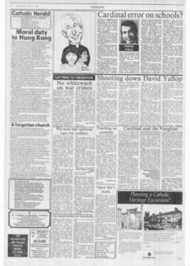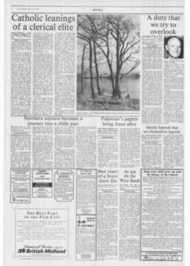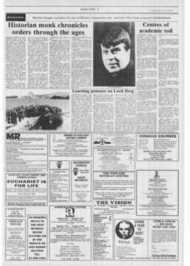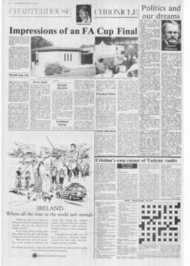Page 3, 9th June 1989
Page 3

Report an error
Noticed an error on this page?If you've noticed an error in this article please click here to report it.
Tags
Share
Related articles
Jesuit Report Questions Council Tax
Jesuit Leader In Poll Tax Protest
Poll Tax Threat Hangs Over Orders
Listening To The Cry Of The Poor
An Underclass Loses Out
Poll tax evaders may form `underclass' warn clerics
by Marlin Newland THOSE hardest hit by recent benefits cuts may give up their most basic social and civil rights in a bid to avoid paying the new poll tax, senior Catholic clergy warned this week.
As community charge registration forms land on doormats throughout England and Wales, Catholics involved in justice and peace work this week predicted that the new tax will help create a sub-class of poor who would rather give up their right to vote than declare themselves eligible for payment.
In the Scottish cities of Glasgow, Edinburgh and Dundee where the poll tax is already in operation, thousands of young people are failing to join the electoral register because this would invite the new charge. According to a recent survey by the newspaper Scotland on Sunday, the heaviest falls in vote registrations occured in the deprived housing estates and inner cities.
In London, a recent survey of inner city boroughs revealed that those not joining the electoral roll may number up to 28,000. Critics of the poll tax assert that the lack of knowledge about the new charge and uncertainty about eligibility for rebates, has forced many to shun contact with benefit offices and electoral agencies for fear that poll tax officers may use these channels to track them down.
"People are frightened by the prospect of paying the poll tax," said Fr Michael CampbellJohnston, Jesuit Provincial and fervent critic of the new charge. "Fears about ability to pay may make people opt out of society, out of voting rights, benefit rights and more drastically, the right to profit from the economic boom underway in this country."
"The poll tax is the last straw. It has helped to isolate those who are economically marginalised in a way that they are, quite literally, forming a socially deprived sub-society."
Fr Campbell-Johnston said
that many religious orders are worried that their exemption from paying the community charge puts them in the position of "profiting from an unjust tax". In response to this dilemma, the Conferences of Major Religious Superiors in England and Wales and in Scotland are considering the "best way" to channel money saved through exemption to the poor and under-privileged.
"The poll tax is not the only reason for people dropping out of public life, but it plays a major role in the creation of a lower class of homeless, drifting people who won't register with any public agency for fear of being caught up with and asked for money they can't afford," said Lewis Donnelly, Director of Westminster Archdiocese's Social and Pastoral Action agency.
"The poll tax can also be seen as helping to create family instability as parents who get on badly with their child are faced with the prospect of having to pay extra for having him or her under their roof. In such cases, some parents would be all the more glad to kick their child out."
"The Scottish experience is that all the bad publicity about the injustice of the new tax in some cases overshadowed any information about rebates with the result that those facing the charge feel overwhelmed. As I understand it, however, you have to pay first and get a refund later.
This is impossible for those who can barely make it on reduced benefits payments," said Mr Donnelly.
Paul Goggins, National Coordinator of Church Action on Poverty, said that the tax would drive the poor and homeless further "underground".
"A person may well choose not to apply for benefit if it means being chased up for the poll tax. Quite apart from this, the signs are that people are not registering for the vote in a bid to avoid the charge. This shouldn't be the case."
blog comments powered by Disqus











